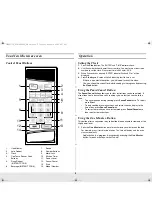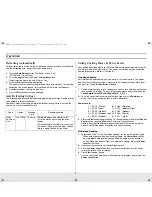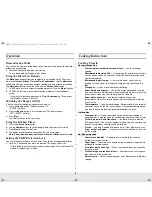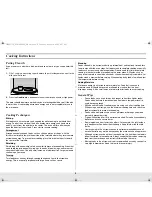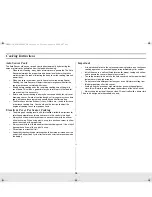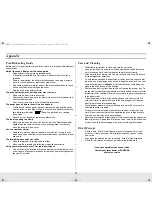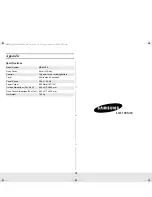
8
Operation
Demonstration Mode
You can use the Demonstration Mode to see how your microwave oven operates
without the oven heating.
1.
Hold the
0
button and then press the
1
button.
To turn demo mode off, repeat step 1 above.
Using the More/Less Buttons
The
More/Less
buttons allow you to adjust pre-set cooking times. They only
work in the
Instant, Kitchen Timer or Time Cook modes
. Use the
More/Less
button only after you have already begun cooking with one of these procedures.
The
More/Less
feature cannot be used with the
Sensor Cook
button.
1.
To ADD more time to an automatic cooking procedure: Press the
More
(9) button.
2.
To REDUCE the time of an automatic cooking procedure: Press the
Less
(1)
button.
If you wish to increase/decrease in
Time Cook
mode
by 10sec, press
the More(9) or Less(1) button.
Switching the Beeper On/Off
You can switch the beeper off whenever you want to.
1.
Press the
Sound
button. The display shows “On”.
(“START” will flash)
2.
Press the
Sound
button to turn the volume off. The display shows:
“OFF”.(“START” will flash)
3.
Press
Start.
The display returns to the time of day.
Using the Kitchen Timer
1.
Press the
Kitchen Timer
button.
2.
Use the
Number
buttons to set the length of time you want the timer to run.
3.
Press
Start
to begin Kitchen Timer.
4.
The display counts down and beeps when the time has elapsed.
Note: The microwave does not turn on when the Kitchen timer is used.
Setting the Child Protection Lock
You can lock your microwave oven so it can’t be used by unsupervised children.
1.
Hold the “0” button and then press the
2
button. The display shows “Loc”.
At this point, the microwave oven cannot be used until it is unlocked. To
unlock it, repeat step 1 above.
Cooking Instructions
Cooking Utensils
Recommended Use
•
Glass and glass-ceramic bowls and dishes
— Use for heating or
cooking.
•
Microwavable browning dish
— Use to brown the exterior of small items
such as steaks, chops, or pancakes. Follow the directions provided with
your browning dish.
•
Microwavable plastic wrap
— Use to retain steam. Leave a small
opening for some steam to escape and avoid placing it directly on the
food.
•
Wax paper
— Use as a cover to prevent spattering.
•
Paper towels and napkins
— Use for short-term heating and covering;
they absorb excess moisture and prevent spattering. Do not use recycled
paper towels, which may contain metal and can catch fire.
•
Paper plates and cups
— Use for short-term heating at low
temperatures. Do not use recycled paper, which may contain metal and
can catch fire.
•
Thermometers
— Use only those labeled “Microwave Safe” and follow all
directions. Check the food in several places. Conventional thermometers
may be used once the food has been removed from the oven.
Limited Use
•
Aluminum foil
— Use narrow strips of foil to prevent overcooking of
exposed areas. Using too much foil can damage your oven, so be careful.
•
Ceramic, porcelain, and stoneware
— Use these if they are labeled
“Microwave Safe”. If they are not labeled, test them to make sure they can
be used safely. Never use dishes with metallic trim.
•
Plastic
— Use only if labeled “Microwave Safe”. Other plastics can melt.
•
Straw, wicker, and wood
— Use only for short-term heating, as they can
be flammable.
Not Recommended
•
Glass jars and bottles
— Regular glass is too thin to be used in a
microwave, and can shatter.
•
Paper bags
— These are a fire hazard, except for popcorn bags that are
designed for microwave use.
•
Styrofoam plates and cups
— These can melt and leave an unhealthy
residue on food.
•
Plastic storage and food containers
— Containers such as margarine
tubs can melt in the microwave.
•
Metal utensils
— These can damage your oven. Remove all metal before
cooking.
tz_ZojlmhTWY\Z`jniUGGwG_GG{ SGhGYSGYWW\GG`a\^Ght





